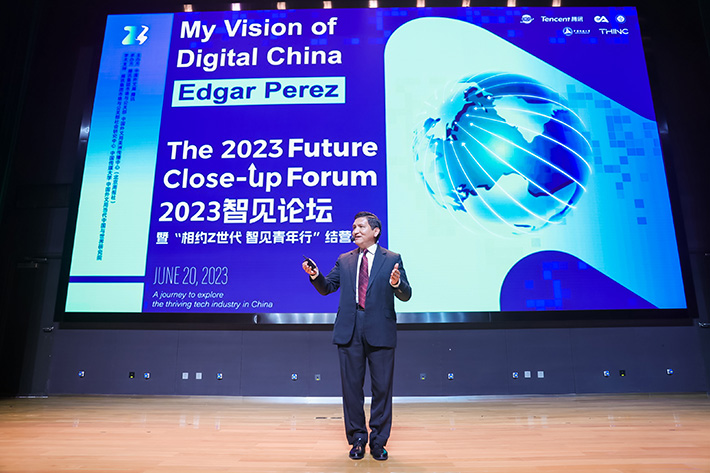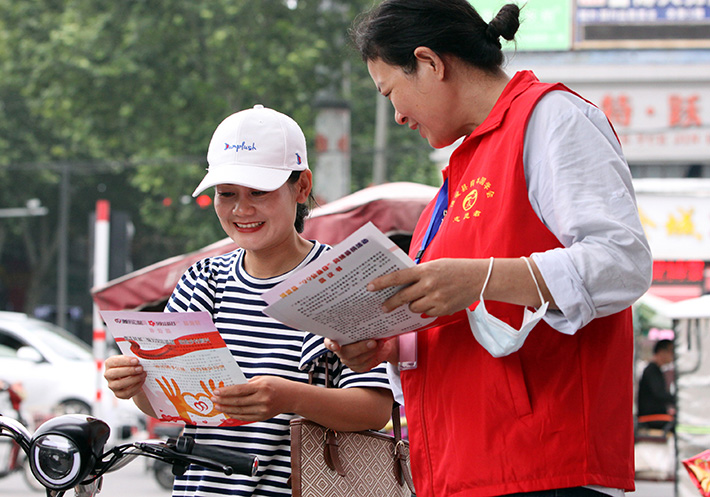|
||||||||||
| Home Nation World Business Opinion Lifestyle ChinAfrica Multimedia Columnists Documents Special Reports |
|
||||||||||
| Home Nation World Business Opinion Lifestyle ChinAfrica Multimedia Columnists Documents Special Reports |
| ChinAfrica |
| Transforming Generosity |
| China’s digital economy influences the evolution of charity culture |
| By Donatien Niyonzima | VOL. 15 September 2023 ·2023-08-30 |

The 2023 Future Close-Up tour participants pose for a group photo in Beijing on 20 June (COURTESY)
The digital age has created new avenues of expression for generosity. The act of giving is no longer confined to traditional channels, but extends to screens, devices and networks. As pixels form the tapestry of compassion, the potential for impact is boundless, waiting to be unlocked by a nation that is poised to harness the digital age for a brighter and more altruistic tomorrow.
China’s digital economy is not just a vehicle for economic growth; it’s also a conduit for fostering compassion and positive change. The convergence of technology and philanthropy has ignited a transformation in giving patterns, redefining the role of individuals and organisations alike. As China journeys further into this new era, it has the opportunity to shape a society where the digital economy and charity culture coalesce, driving a future where each digital interaction can spark meaningful change in the lives of many.
As the Charity Day in China and the 9 September Giving Day, both celebrated in September every year approach, it’s worth delving into the intricate relationship between China’s digital prowess and the evolving ethos of charity, exploring how technology is redefining the ways people engage, contribute to and impact society. China’s digital economy, epitomised by industry giants like Tencent, Alibaba and JD.com, has set the stage for a revolutionary change in charitable giving. As online platforms redefine convenience and accessibility, a paradigm shift in philanthropy is underway.
Small but impactful
At the core of this transformation lies the rise of micro-donations facilitated by platforms such as Alipay and WeChat Pay. Through a simple QR code scan, individuals can contribute even the smallest amounts to various causes. This democratisation of giving transcends socioeconomic boundaries, enabling everyone to participate in building a better society.
Ge Yan, secretary general of the Tencent Charity Foundation, finds that the ascendancy of mobile payment platforms such as WeChat Pay has substantially reshaped the landscape of charitable donations. She thinks that these mobile payment tools have facilitated ease of fundraising and financing.
Ge said, “While there has been a fervent enthusiasm for inclusive participation in philanthropic endeavours, the lack of convenient online payment methods in the past necessitated the monetisation of charitable activities as a crucial facet for corporations to integrate philanthropic initiatives into their business strategies. This novel innovation has exerted profound implications on the nation’s sustainable growth and economic development.”
This view was echoed by Jibran Ali Khan, a Pakistani and one of the 16 young leaders and change-makers from 14 countries who joined the Future Close-Up tour, jointly organised by China International Communications Group (CICG) and Tencent in the middle of June 2023. He observed a positive impact of technology on philanthropy in China. “It’s a brilliant idea to organise the Chinese nation as a collective towards a social goal,” he remarked.
According to Ge, captivating public engagement through innovative means is pivotal to instilling enthusiasm for philanthropic endeavours. “Take the ‘Donation by Steps’ programme on the Tencent Charity Platform as an example. This innovative donation method has garnered widespread popularity due to its perceived entertainment value, akin to a widely enjoyed game,” she told ChinAfrica.
These micro-donations exemplify the beauty of digital technology in fostering collective action. With a few taps on a smartphone, a person can donate a modest sum, collectively contributing to substantial impact. This ease of participation is breaking down the barriers of traditional philanthropy, inviting a broader spectrum of society to become part of the charitable fabric. “Charity concepts such as donation in steps and micro-donations not only entertain but also contribute to individual health and environmental improvement, rendering donations new meaning,” explained Ge.
She however noted that innovation and responsibility are not mutually exclusive, adding that on the Tencent Charity Platform, multiple philanthropic projects are integrated, necessitating the platform to ensure transparency in donations and provide timely feedback to donors.
The micro-donations with significant social impact in the society are also at the core of annual digital crowdfunding festivals in China. Digital crowdfunding platforms have in fact ignited a fire of grassroots activism. Initiatives like Tencent’s 9 September Charity Day provide a digital stage for campaigns that capture the public’s attention. By combining compelling narratives with social media outreach, these platforms magnify the impact of charitable projects and inspire widespread participation. In this digital age, the stories of those in need are no longer confined to local circles. These narratives, fuelled by the connectivity of social media, have the potential to reach millions of hearts and wallets. The real-time nature of online giving campaigns empowers individuals to become change-makers instantaneously, united by their shared goal of making a difference.

Edgar Perez, one of the participants of the Future Close- Up tour organised by CICG and Tencent, makes a presentation in Beijing on 20 June (COURTESY)
New charity culture
Beyond revolutionising the act of giving, the digital era has ushered in a transformation of the very culture surrounding charity. The advent of digital platforms has shifted charitable engagement from passive to active. Virtual volunteering has emerged as a powerful tool, allowing individuals to contribute their skills remotely. From online mentorship to virtual community-building initiatives, the digital landscape enables people to give their time and expertise on their terms.
Virtual volunteering is more than just a technological workaround for geographical barriers; it’s a fundamental reimagining of how people can make meaningful contributions. In the virtual realm, borders dissolve, allowing professionals from metropolises to collaborate with aspiring talents in rural areas. The digital fabric enables a mentor in big cities such as Beijing and Shanghai to empower a student in a remote village with knowledge and hope.
One of the catalysers of philanthropy is social media platforms which act as incubators of personal philanthropy. Entrepreneurs, influencers and individuals are using their digital presence to advocate for causes they hold dear. Through compelling storytelling and personal commitment, they are inspiring a new generation of philanthropists who are passionately engaged and empowered to drive change.
The power of individual advocacy in the digital era is akin to a stone creating ripples across a tranquil pond. A single passionate post can reverberate through networks, inspiring countless others to lend their support. These digital advocates have become champions not just for the causes they champion but for the very idea that every person, armed with a smartphone and conviction, can impact the world.

Mongolian gazelles are seen in a shrub wood reforested with the support of Alipay Ant Forest, a public welfare platform, in Tengger Desert in northwest China’s Ningxia Hui Autonomous Region on 4 January (CNS)

A volunteer (right) promotes the 9 September Giving Day to a resident in Jiaozuo, Henan Province, on 5 September 2021 (CNS)
Trust and transparency
While the integration of digital technology and charity culture holds immense promise, it also faces challenges that require attention for sustained growth and impact. As the digital economy flourishes, it’s imperative to address the digital divide and ensure equitable access to digital platforms for all segments of society. Bridging this gap is essential to enable inclusive participation in the digital charity movement.
The rapid growth of digital giving also necessitates the development of robust regulatory frameworks that promote transparency, accountability and responsible practices. Balancing innovation with oversight is crucial to maintaining public trust and ensuring the integrity of charitable endeavours.
The secretary general of Tencent Charity Foundation assured that in this digital terrain, where a single viral campaign can attract massive funds within hours, a delicate equilibrium must be struck. Her view is that regulations do not stifle innovation but instead serve as guardrails, guiding the digital charity movement towards ethical and impactful outcomes.
“Tencent Charity, in collaboration with Non-Profit Incubator, initiated a transparent philanthropy action plan, channelling funds and field visits to enhance transparency and accountability in philanthropic projects, cultivating public trust and participation,” she added.
In order to strengthen trust and transparency, the use of technology is still indispensable. Real-time data analytics is done to provide insights into the effectiveness of charitable initiatives, allowing stakeholders to refine strategies, allocate resources wisely, and ensure that every contribution yields maximum social good. Above that, blockchain is used for enhanced transparency.
Blockchain technology has the potential to revolutionise transparency in charitable endeavours. By providing an immutable ledger of transactions, donors can trace their contributions from initiation to execution, eradicating doubts about fund allocation and reinforcing public trust in the digital charity ecosystem.
Ge told ChinAfrica that blockchain technology, as a collectively maintained information database, once stored, becomes immutable. She further explained that Tencent, as early as 2015, embarked on the development of blockchain technology in the financial domain. “Since 2020, the 9 September Giving Day has been operating based on Tencent’s secure blockchain technology. In collaboration with corporations, industry associations and regulatory bodies, Tencent established a public welfare credit consortium blockchain, encompassing all fundraising projects of the 9 September Giving Day, thereby augmenting transparency and accountability in charitable activities,” she added.
The convergence of China’s digital economy and charity culture is crafting a narrative of hope, participation and empowerment. Micro-donations are unifying diverse voices under the banner of altruism, while virtual volunteering bridges geographic gaps and fosters active engagement. Individual advocacy, powered by the amplification of social media, has transformed everyday individuals into catalysts of change.
As China embraces the digital age, it has the opportunity to script a future where technology enriches not only commerce but compassion. In this new era, the potential for meaningful change is inextricably linked with the clicks, swipes and interactions that define the digital age. As China threads the delicate fabric of technology and humanity, it has the chance to weave a tapestry of compassion that spans across screens, devices and hearts. This tapestry, embroidered with the stories of countless individuals united by the common goal of a better world, has the potential to inspire, uplift and redefine what it means to give in the digital age.

Jibran Ali Khan, a Pakistani participant of the Future Close-Up tour organised by CICG and Tencent, speaks during an event in Beijing on 20 June (COURTESY)
| About Us | Contact Us | Advertise with Us | Subscribe |
| Copyright Beijing Review All rights reserved 京ICP备08005356号-5 京公网安备110102005860号 |